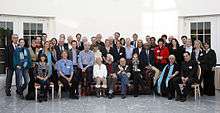World Future Council

The World Future Council (WFC) is an independent body formally founded in Hamburg, Germany on 10 May 2007.[1] "Formed to speak on behalf of policy solutions that serve the interests of future generations",[2] it includes members active in governmental bodies, civil society, business, science and the arts. The WFC's primary focus has been climate security,[3] promoting laws such as the renewable energy Feed-in tariff.[4] The World Future Council has special consultative status with the Economic and Social Council.[5]

History
The World Future Council was founded by the Swedish writer and activist Jakob von Uexkull.[6] The idea for a global council was first aired on German radio in 1998. In October 2004 the organisation began in London with funding from private donors in Germany, Switzerland, USA and the UK. Since 2006, the organisation is based in Hamburg, where the World Future Council is registered as a charitable foundation. Further offices are located in London, Brussels, Johannesburg and Washington D.C. The Council meets once a year at the Annual General Meeting.[7]
The Hamburg Call to Action
The Hamburg Call to Action was unanimously agreed upon by all Councillors present at the Founding Ceremony of the World Future Council, 9–13 May 2007.[1] It calls for the preservation of the environment and the health of communities, the promotion of "systems and institutions based on equity and justice", safeguarding traditional indigenous tribal rights, the protection of present and future generations from war crimes and crimes against humanity, a sustainable production, trade, financial and monetary system, the revival of local democracies and economies, and a universal ban on nuclear and depleted uranium weapons, cluster ammunition and landmines. It aims to generate governmental support for renewable energy technologies, the protection of forests and oceans, secure healthy food and water supplies, environmental security, healthcare, education and shelter, and a strengthened United Nations.[7]
Activities

- Future Policy Award
The Future Policy Award celebrates policies that create better living conditions for current and future generations. The aim of the award is to raise global awareness for these exemplary policies and speed up policy action towards just, sustainable and peaceful societies. The Future Policy Award is the first award that celebrates policies rather than people on an international level. Each year the World Future Council chooses one topic on which policy progress is particularly urgent. In 2009, the Future Policy Award highlighted exemplary policies for food security. In the International Year on Biodiversity, the Future Policy Award 2010 celebrated the world's best biodiversity policies. In the International Year of Forests, the Future Policy Award 2011 celebrated successful policies that protect, enhance and sustainably utilize forests for people, and thus contribute to a better world. In 2012, the Future Policy Award will celebrate the world’s most inspiring, innovative and influential policies on the protection of oceans and coasts.
- Expert Commission on Cities and Climate Change
Together, the WFC and Hamburg HafenCity University, founded the international Expert Commission on Cities and Climate Change in 2008. The commission comprises 20 experts in the field of regenerative city development including architects, city planners and representatives of UN Habitat, the United Nations Human Settlements Programme. Holding direct advisory mandates for UN Habitat’s World Urban Campaign, the WFC provided the Campaign’s network with a catalogue of criteria for future just policies.
- Implementation of Feed-in Tariff Laws
Feed-In Tariff (FIT) laws to speed up renewable energy production have been introduced in several countries e.g. the UK, Australia, several US states, among them California, as well as in Ontario (Canada), with the support of the World Future Council. In establishing the Alliance for Renewable Energy, the World Future Council has created a coalition to spread renewable energies and contributed to the implementation of Feed-in Tariffs in the United States.
- Nuclear Abolition Forum
With the support of the UN High Representative for Disarmament Affairs, Sergio Duarte, the World Future Council launched in 2011 the Nuclear Abolition Forum – a joint-project of 8 leading organizations in the disarmament field, hosted by the WFC. The Forum aims to examine critique and debate key nuclear disarmament issues, thereby paving the way for building the framework for achieving and sustaining a nuclear weapon-free world. To this end, it offers a website for posting articles and discussing key nuclear abolition aspects and initiatives, and a periodical which will focus on specific nuclear disarmament themes or elements.
- Implementing the rights of persons with disabilities
The World Future Council has undertaken research on exemplary laws and policies implementing the rights of persons with disabilities. Together with the Essl Foundation, the WFC gathered more than 240 decision-makers from 34 countries at the first International Conference on Good Policies for Persons with Disabilities in January 2012 in Vienna, closed with the keynote speech of Dr Christian Strohal, Vice-President of the UN Human Rights Council. The WFC and the Essl Foundation currently agreed a five-year cooperation, under the name Zero Project.
- African Renewable Energy Alliance
The World Future Council founded the African Renewable Energy Alliance (AREA) in October 2009. It is a network comprising about 760 members from 70 countries (in February 2012). In order to promote renewable energies in Africa, AREA has co-organized international conferences and meetings on "Renewable Energy for Sustainable African Development" in South Africa, Ghana, Cape Verde, Nigeria and Morocco.
- Campaign for Ombudspersons for Future Generations
The WFC has embarked on a Campaign for Ombudspersons for Future Generations on all governance levels. For the United Nations Conference on Sustainable Development, or ‘Rio+20’ in Rio de Janeiro, Brazil, in June 2012 the WFC was calling for the establishment of Ombudspersons for Future Generations, as a concrete solution under the second theme of the Summit ‘Institutional Framework for Sustainable Development’.[8]
- FuturePolicy.org
The internet platform www.futurepolicy.org presents political solutions and assists decision-makers in developing and implementing future just policies. It now contains policies, for example on renewable energies, energy efficiency, sustainable cities and food production in the era of climate change, that have been promoted in WFC publications, films and hearings.
Councillors
The World Future Council (WFC) consists of up to 50 personalities from all five continents. They represent governments, parliaments, the arts, civil society, academia and the business world. Together they form a voice for the rights of future generations.
|
|
|
Honorary Councillors
|
|
|
Research and publications
- Miguel Mendonça, David Jacobs and Benjamin K. Sovacool (2009). Powering the Green Economy: The Feed-In Tariff Handbook, Earthscan, ISBN 978-1-84407-858-5
- Herbert Girardet and Miguel Mendonça (2009). A Renewable World: Energy, Ecology, Equality, Green Books, ISBN 978-1-900322-49-2
- Herbert Girardet (editor) (2008). Surviving the Century: Facing Climate Chaos and Other Global Challenges, Earthscan, ISBN 978-1-84407-612-3
- Herbert Girardet (2008). Cities People Planet: Liveable Cities for a Sustainable World, Wiley, ISBN 0-470-85284-4
- Miguel Mendonça (2007). Feed-in Tariffs: Accelerating the deployment of renewable energy, Earthscan, ISBN 978-1-84407-788-5
- Jakob von Uexkull and Herbert Girardet (2005). Shaping our Future: Creating the World Future Council, Green Books / World Future Council Initiative, ISBN 1-903998-46-8
References
- 1 2 "Vandana Shiva elected to World Future Council", Boloji.com
- ↑ ECI Congratulates the World Future Council
- ↑ "WFC accuses industrial nations of putting brakes on climate talks", People's Daily Online, 8 December 2007
- ↑ "Klimaschutzfinanzierung: IWF greift Vorschlag des World Future Council auf", Oekonews.at, 2 June 2010
- ↑ "Committee on Non-Governmental Organizations Recommends Status for Nine Entities, Defers 33", un.org, 22 May 2014
- ↑ "We are taxing the lives of future generations" Deutsche Welle, 5 October 2007
- 1 2 http://www.worldfuturecouncil.org
- ↑ http://peacemealproject.com/2012/06/21/the-world-future-councils-bread-tank-project/
External links
- World Future Council
- FuturePolicy.org - Good Policies for Future Generations
- African Renewable Energy Alliance (AREA)
- Future Finance Blog
- Climate & Energy Commission Blog
- 2012 Future Policy Award Blog
- Renewable Energy World - Developing Nations Eye Renewable Energy
- Ghanaian village to watch World Cup on the big screen
- WFC Grades North American FIT Programs
- Giving our future a face: We need guardians for long-term well-being
- Global Challenges - Increased GDP in the short term can entail destruction of foundations of life in the long-term